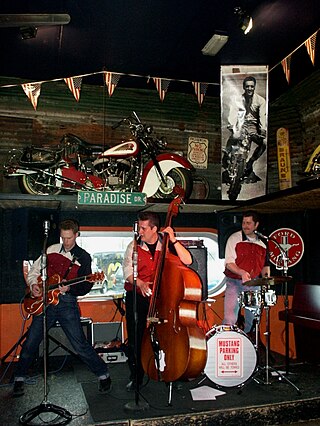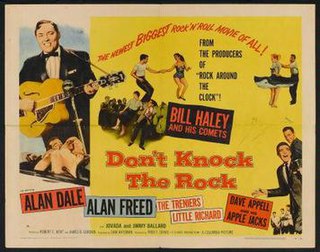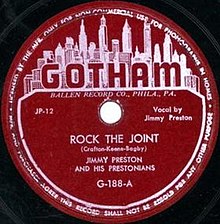
William John Clifton Haley was an American rock and roll musician. He is credited by many with first popularizing this form of music in the early 1950s with his group Bill Haley & His Comets and million-selling hits such as "Rock Around the Clock", "See You Later, Alligator", "Shake, Rattle and Roll", "Rocket 88", "Skinny Minnie", and "Razzle Dazzle". Haley has sold over 60 million records worldwide. In 1987, he was posthumously inducted into the Rock and Roll Hall of Fame.

"Rock Around the Clock" is a rock and roll song in the 12-bar blues format written by Max C. Freedman and James E. Myers in 1952. The best-known and most successful rendition was recorded by Bill Haley & His Comets in 1954 for American Decca. It was a number one single for two months and did well on the United Kingdom charts; the recording also reentered the UK Singles Chart in the 1960s and 1970s.

Bill Haley & His Comets was an American rock and roll band formed in 1947 and continuing until Haley's death in 1981. The band was also known as Bill Haley and the Comets and Bill Haley's Comets. From late 1954 to late 1956, the group recorded nine Top 20 singles, one of which was number one and three that were Top Ten. The single "Rock Around the Clock" was the best-selling rock single in the history of the genre and maintained that position for several years.

Rockabilly is one of the earliest styles of rock and roll music. It dates back to the early 1950s in the United States, especially the South. As a genre, it blends the sound of Western musical styles such as country with that of rhythm and blues, leading to what is considered "classic" rock and roll. Some have also described it as a blend of bluegrass with rock and roll. The term "rockabilly" itself is a portmanteau of "rock" and "hillbilly", the latter a reference to the country music that contributed strongly to the style. Other important influences on rockabilly include western swing, boogie-woogie, jump blues, and electric blues.

Don't Knock the Rock is a 1956 American musical film starring Alan Dale and Alan Freed. Directed by Fred F. Sears, the film also features performances by Bill Haley & His Comets, Little Richard, The Treniers, and Dave Appell and the Applejacks.
James Edward Myers was an American songwriter, music publisher, actor, director, producer, and raconteur.

Marshall Edward Lytle was an American rock and roll bassist, best known for his work with the groups Bill Haley & His Comets and The Jodimars in the 1950s. He played upright slap bass on the iconic 1950s rock and roll records "Crazy Man, Crazy", "Shake, Rattle and Roll", and "Rock Around the Clock".

"Crazy Man, Crazy" was the title of an early rock and roll song written by, and first recorded by Bill Haley & His Comets in April 1953. It is notable as the first recognized rock and roll recording to appear on the national American musical charts, peaking at #12 on the Billboard Juke Box chart for the week ending June 20, 1953, and #11 for two weeks on the Cash Box chart beginning for the week of June 13.
Donato Joseph "Danny" Cedrone was an American guitarist and bandleader, best known for his work with Bill Haley & His Comets on their epochal "Rock Around the Clock" in 1954.

"Good Rocking Tonight" is a jump blues song originally released in 1947 by its writer, Roy Brown and was covered by many recording artists. The song includes the memorable refrain, "Well I heard the news, there's good rocking tonight!" The song anticipated elements of rock and roll music.
James Alfred Smith Preston, was an American R&B bandleader, alto saxophonist, drummer and singer who made an important contribution to early rock and roll.

Shake, Rattle and Roll is an early rock and roll compilation album issued by Decca Records in 1955, and featuring music by Bill Haley & His Comets. The album, which was issued in a 10-inch format, consisted of recordings previously issued on singles in 1954 and 1955, including the title track, and "Rock Around the Clock", although at the time of this album's release in early 1955, "Rock Around the Clock" had not yet become a major hit. This was Haley's second album, and was one of the first album-length releases of the rock and roll era, predating the release of Elvis Presley's first album by a year.

Rock 'n Roll Stage Show is the first studio album and fourth overall album by rock and roll band Bill Haley and His Comets. Released by Decca Records in August 1956, it was the group's first album to include new, as opposed to previously released material. Although the album spawned several singles, it also featured several album-only tracks.

Bill Haley and His Comets is the title of the tenth album of rock and roll recordings by Bill Haley & His Comets. Released in April 1960, it was the band's first album release for Warner Bros. Records, following their departure from Decca Records at the end of 1959. The recordings were produced by George Avakian, who succeeded Haley's Decca producer, Milt Gabler.
The Stargazers are a British rock and roll band.

"Rock-A-Beatin' Boogie" is a 1952 song composed by Bill Haley and first recorded by the Esquire Boys in 1952. Bill Haley and the Comets recorded the song in 1955 for Decca. The song was featured in the 1956 movie Rock Around the Clock.

"Rudy's Rock" is a 1956 instrumental composed by Bill Haley and Rudy Pompilli and released as a Decca single. The song appeared in the 1956 Columbia Pictures movie Rock Around the Clock. The single peaked at #34 on Billboard and #26 in the UK on the Record Retailers chart.
Max Charles Freedman was an American songwriter and lyricist, best remembered for co-writing the song "Rock Around the Clock".
Bill Haley & His Comets recorded many singles and albums. The following list references only their original release and generally does not include compilation albums or single reissues. This list does not include releases on which the Comets worked as session musicians, and primarily focuses on releases during Haley's lifetime.

"R-O-C-K" is a 1956 rock and roll song recorded and co-written by Bill Haley and released as a Decca single. The song appeared in the 1956 Columbia Pictures movie Rock Around the Clock. The single peaked at #16 on Billboard.














